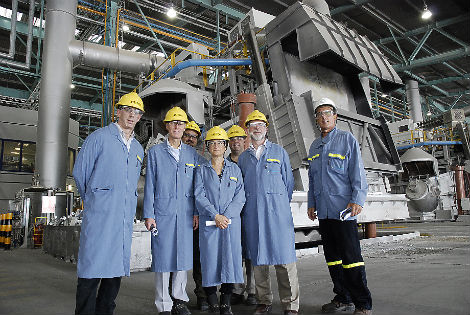from left to right - Dr. Philip Leopold, Dr. Vassilia Partali, Dr. Frank Di Salvo, Sergio Vasco Zunguze, Process Engineer with the Carbon Group, Qatalum, Dr. James Roach, Dr. Hans-Richard Sliwka and Dr. Michael Pungente.
Six chemistry professors, two from Qatar’s Weill Cornell Medical College, one from Cornell University’s main campus in Ithaca, NY, together with three other visiting professors from abroad paid a visit to Qatalum, the state-of-the-art aluminium plant that is being built in a joint venture between Qatar Petroleum and Hydro in line with Qatar’s long-term economic diversification strategy.
Weill Cornell Medical College in Qatar was established in 2001 as a partnership between Qatar Foundation and Cornell University, an Ivy League university in New York, USA. It is the first medical school in Qatar, and the first American medical school ever set up overseas.
Dr. Michael Pungente, Professor of Chemistry led the group made up of Dr. James Roach, both with Qatar's Weill Cornell Medical College, together with Dr. Frank Di Salvo (with Cornell University), Dr. Vassilia Partali and Dr. Hans-Richard Sliwka (with NTNU in Trodheim, Norway), Dr. Philip Leopold (with Stevens Institute of Technology in Hoboken, NJ) visited the Qatalum site and were interested in learning about any new technologies exploiting the vast natural gas resources of Qatar.
Said, Qatalum CEO, Jan Arve Haugan, "At Qatalum we believe in working together with organisations in Qatar and the region as a whole to increase the knowledge about aluminium and build on competence in order to develop the industry further. We were delighted to be able to share knowledge with representatives of one of Qatar's tertiary institutions and look forward to continuing to work with similar institutions in the future."
The visitors were shown around the Qatalum plant, starting at the Power Plant and through the Carbon, Reduction and Cast

Far right, Geir Arne Olsen , Head of training, Casthouse
Speaking of the visit, Dr. Michael Pungente said, "There are a multitude of reasons that we wanted to visit the Qatalum plant. But all those of us who are involved in chemistry research and teaching here in Doha are all interested in learning about any new technologies using the vast natural gas resources of Qatar. Several of us also teach inorganic chemistry, and aluminium production is part of the subject matter we teach, so being able to see a state-of-the-art smelter first hand will be an invaluable experience."
"The Qatalum plant is quite clearly a very significant step forward in the development of Qatar's infrastructure and a great example of the aim of increasing the sustainability of the economy and further development of value-added enterprises. Each of us is concerned with the environmental effects of industrial activity. The whole Qatalum operation is held to stringent controls and provides an excellent illustration of the importance of environmentally-sound industrial practices in Qatar," Prof Pungente added.

